The Little Things
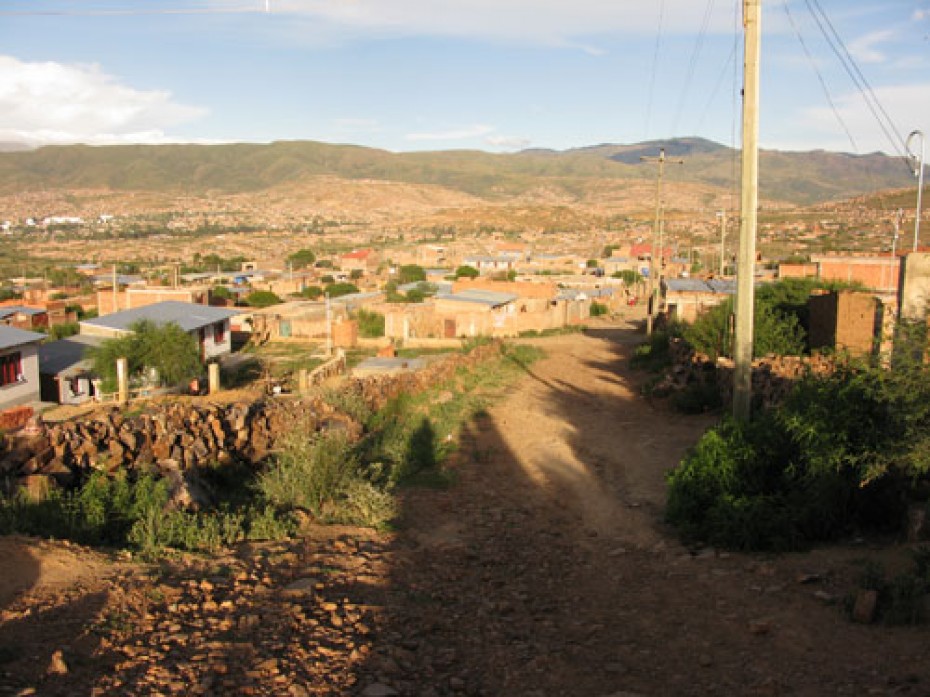
Brandy and her group of sponsors are in Bolivia where they recently toured a Child Survival Program and met Rosario on their home visit—a time filled with little things.
Continue Reading ›What Makes Gratitude Overflow?

There is something special about giving a gift to a child who rarely receives gifts. Most families in developing countries don’t have the extra funds to buy gifts like bubbles and Dora dolls.
Continue Reading ›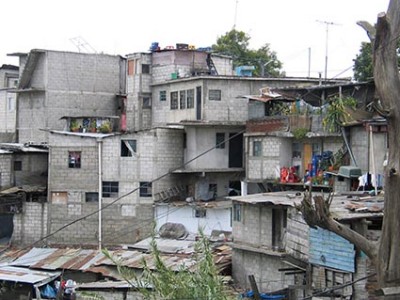
A Pear and a Prayer
Tears poured down Cesar’s face. He was ready to give up. You could feel it in every fiber of his being.
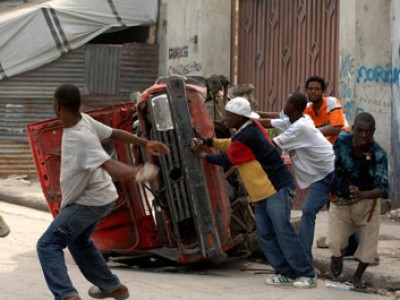
Haiti in Realtime: What Defines ‘Non-Violent’?
The streets are still filled with debris, smoldering tires and overturned cars. Few cars can pass, so transportation is limited to motorcycles and feet. There are still pockets of violence throughout the city, but it’s so much quieter today. Quiet enough for me to think. Which can sometimes be dangerous.

Grace in the Chaos: A Report from Haiti
I thought I was imagining it at first. I do have an overactive imagination, after all. But I couldn’t mistake the chanting. I crept to the window, and as icy cold water from the air conditioner dripped on my feet, I heard the city exploding. Nothing had blown over. It had blown up. I lay back in my bed. The voices outside grew louder, then quieter. I willed them to fade away. They didn’t.
Battered, Broken, Beautiful Haiti
I saw people begging on the streets, just as I thought I would. But I also saw a young man, profoundly handicapped, sitting in a dark alley, pounding his head against the wall. That single image of brokenness, of pain, sits in my chest like a stone. Haiti somehow breaks my heart.
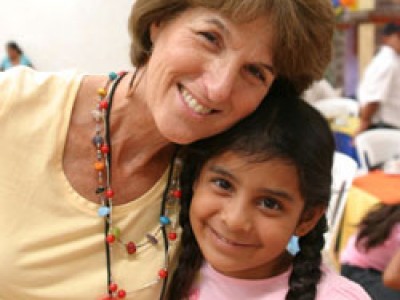
Made for Each Other
Each of your sponsored children is uniquely yours. You may not know the reason exactly, but that child was chosen by you for a reason. And you were chose for for that child.
Baking Without a KitchenAid in Sight
The girls teaching me to bake were part of a baking class at the Compassion student center I was visiting in Quetzaltenango, Guatemala. As part of the class, they make snacks for the nearly 400 students at the center. They also make baked goods they can sell in the community. With that money, they have been able to construct new classrooms at the center.
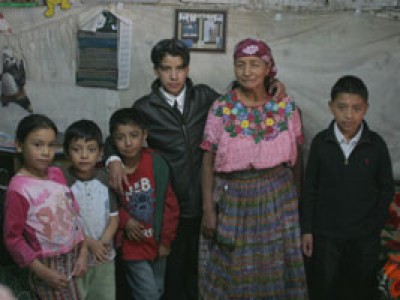
A Pear and Prayer
There is nothing in the world like visiting a Compassion-assisted child’s home. Absolutely nothing. Nothing can prepare you for the sights, the sounds, the smells. Most of all, nothing can prepare you for the beating your heart is about to take. It’s like you got in a fight with the Holy Spirit. And every time, the Holy Spirit leaves you limping and bruised and, thankfully, a better person for the battle.
One Child, Each Child, Every Child Is Special
As you know, we recently announced our millionth sponsored child. Now, I won’t tell you a lot of random facts about 1 million.
Like how long it would take you to count to 1 million (14 days).
Or how much 1 million dollar bills weigh (2,204 pounds).
Because as important as 1 million is, and as huge of a milestone as 1 million sponsored children is, it’s really just about one child.
And a few weeks ago, I got to meet that one child — Fellow Blewussi Kpodo. He lives in a dusty community just outside of Lomé, Togo.
Fellow’s whole family had come out for our meeting. His father stood proudly, his arm on the shoulder of his oldest son. Fellow’s two older sisters darted in and out of the house, covering their faces and giggling at the sight of my pale skin. His younger brother made himself at home in my lap.
All the while, Fellow watched the commotion with his solemn brown eyes.
I stared at his eyes when he wasn’t looking. Fringed with dark eyelashes, I wondered at what they had seen.
They had watched his father battered by grief when Fellow’s mother died five years ago.
They had filled with tears when the headmaster sent him home from school because he didn’t have his school fees — again.
They had stung with smoke as he bent over the small fire he prepared every evening for his sisters to cook cassava and dried fish for dinner.
And now, those same eyes sought out mine.
“He has a question for you,” explained the interpreter. I nodded. “He wants to know if you know his sponsor.”
I grinned at Fellow, and for the first time a smile reached his eyes.
“I don’t know her,” I explained. “But I know that you are very special to her.”
And in that moment, everything else faded away. Fellow wasn’t one of a million children. He was just one.
One child.
One sponsor.
One more step toward changing the world.
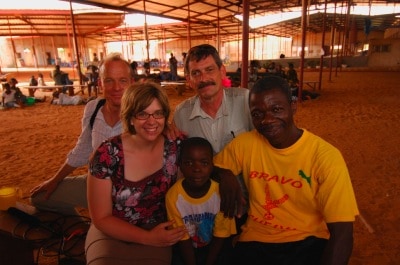
“The child must know that he is a miracle, that since the beginning of the world there hasn’t been, and until the end of the world there will not be, another child like him.” – Pablo Casals
She Is Hungry
She didn’t eat yesterday.
The little girl told me that as we sat with her and her mother under a mango tree. The fruit was not ripe yet, and still sat high and green and out of her reach.
Just behind the house, a few rows of corn grew. But they didn’t belong to her family. She could see them every day. But they were out of her reach.
I feel like every week I write about children who “went to bed hungry.” And they did. But right then, I sat before a little girl who literally went to bed less than 24 hours ago with nothing to eat.
I tried to imagine the tiny bit of hunger I’ve felt in my life, magnified. That small ache after missing a meal turned into deep pain after missing one, two, three meals. The slight ache when I take my lunch late turned into a pounding, relentless headache when late turns into never.
I couldn’t imagine it. But this little girl doesn’t have to imagine it. She lives it.
She is hungry when she walks past the market, her pockets empty.
She is hungry when her neighbors light up their braziers at night while her family’s remains cold.
She is hungry while fresh fruits and vegetables are in her sight, but not on her table.
As we left that night, we hauled a bag of rice out of the back of our van. Her mother bowed her head, thanking us over and over. And I knew that when this little girl visited the child development center, she would receive a meal. And that the center workers would watch her carefully, and at the first sign of malnutrition, she would be treated.
Those things are not out of her reach.
Merci
She walked slowly out of her classroom, her face turned towards the ground. Her shoulders hunched up around her ears, the ragged sleeves of her dress nearly reaching her elbows.
“What’s wrong with her?” I asked the group around me. They stopped the girl, and French phrases passed much too quickly for me to keep up. Finally, someone translated for me.
“She can’t pay her school fees, so they’re sending her home.”
That’s when I noticed the headmaster, moving from class to class, a list in his hands. Those were the children who hadn’t paid their fees. He was calling them to the front of their class and asking for the school’s money. And if they didn’t have it, they were sent home.
Read the rest of the entry at I’m Just Sayin’
Afi’s Angle
I’m currently on a story-gathering trip in Lome, Togo, our newest country, which is where I met Afi.
Afi stood shyly inside her home as we hauled in our gear — cameras, video equipment, tripods and microphones. Her dusty yard was shaded by heavy papaya trees, offering a bit of relief from the hot sun that had beat down on us for the past few hours.
I sat on a small wooden stool, worn smooth.
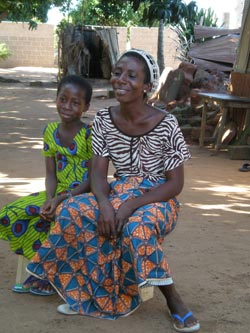 Afi’s brothers crowded onto a splintered bench that leaned against a tree trunk. Afi and her mother sat close together, a microphone just a few inches from their heads.
Afi’s brothers crowded onto a splintered bench that leaned against a tree trunk. Afi and her mother sat close together, a microphone just a few inches from their heads.
The interview went smoothly. But my mind is one of a journalist. So I sat there, gnawing on my pen cap, wondering what my “angle” would be.
My thoughts were interrupted when one of the child development center workers leaned close and began whispering to me.
She told me that 8-year-old Afi had been to school for only three months in her entire life. Yet, just a few weeks ago she had tested eighth out of the 50 children in her class.
This quiet little girl in front of me, the one who swept the dirt yard of her family’s compound at this very moment, was brilliant. And it hit me.
Afi wasn’t a rebellious child who had been reformed by Compassion. She was relatively healthy. Her parents loved her and had never abused her.
But if not for the support of Compassion, Afi would have slipped through the cracks. She would have spent entire days on the futile task of sweeping that very dirt yard.
I don’t know if she would have found some other way to further her education. I don’t know if God would have provided some other way for her to overcome.
But I don’t have to wonder about those things. Afi is in school now. She is learning and growing every day.
I know that she has opportunities that didn’t exist for her a year ago. And I know that she has not slipped through the cracks.
I believe Afi’s world has been changed.
But I also believe that Afi will change the world.
That is Afi’s angle.
199
“How many children are at the project we’re going to?” I asked the Compassion worker as we finished up lunch.
“One hundred ninety-nine,” she answered. What an odd number. She must have noticed my confused look.
“They lost a child last month.”
I wished with everything that “lost a child” literally meant lost a child. As in just misplaced for a few days. She would be back soon. But I knew that wasn’t the case.
“What happened to her?” someone else at the table asked. I couldn’t bring myself to say it. I couldn’t acknowledge what “lost” really meant.
Read the rest of the entry at I’m Just Sayin’


